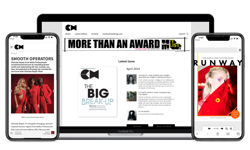
Q: How would publishers benefit from managing their data more efficiently?
A:
Being from a direct marketing background (originally as a young marketing analyst for an American-owned romantic fiction publishers), I still consider data should be at the heart of everything you do. You need to have a data-led resource in-house or outsource it to someone who has.Having a single view of what you have, refreshing it and adding to it is a constant process and using it in the right way makes the difference between success and failure. You can have the best wordsmiths and the best graphic designers in the world but if you are aiming your products at the wrong people, you’re getting nowhere.
I think in times like these, you've got to be ready – lean, mean and hungry to get on with it, when the tornado has left. That being the case, I think getting your data in the right way and being able to use it effectively is at the top of the queue.
Q: What are the main data management challenges facing publishers?
A:
I think it is to have a company culture that understand the benefits of best data management. GDPR woke a few up from their slumbers (although some have gone back to sleep again). All the tenets of GDPR point towards best practice data management. With the proliferation of communication out there and the noise it causes, your audience demands more from you. They want the products you send them to be relevant and they want the constant opportunity to be able to tell you what their preferences are and change their mind. They’ll soon go somewhere else if you don’t provide these two things.Q: What works best: one-stop-shop data software or different marketing stacks?
A:
I can see value in both.Having everyone working in the same way and using the same software to do their job is a nirvana many want to reach. But there are benefits to using best-in-breed software for each data task:
- One-stop-shop software cannot usually compete with the functionality of the specialist options
- It takes a whole lot of work, company involvement and company-wide buy-in to get people to stop using the sales management, email and accounting packages they have been using and have worked out how to use efficiently.
- For a one-stop-shop data solution to work, all the different formats of the data currently held in different systems have to be shoe-horned into another uniform format, which doesn't please anybody rather than does please everybody.
Q: Can you suggest three quick-win changes publishers could implement today to improve their data management performance?
A:
- Find someone to champion the benefits of data management. Everyone has priorities in their role and, for most, that's not data. There's got to be someone in the board room who is responsible for data strategy and who keeps it high up on the agenda. I have seen many great initiatives fail when this is not the case.
- Have the software in place to reap the rewards. Don't have your head turned by the bells and whistles that never get used, but that come with a lot of data platforms. Work out exactly what you need, leave room for expansion and grow as your needs grow.
- Give your audience the power over what they receive from you. GDPR has made this a priority as has customer expectation. Give your audience the ability to choose what they want and when they want it. They'll be far more engaged with your content and that keeps your advertisers happy
Q: What trends are you seeing in the way that publishers use customer data?
A:
The two biggest changes I am seeing in how B2B publishers use customer data is the targeting of more niche content and the analysis of that data to produce behavioural analysis.Specialist content, when targeted at the right audience, produces good subscription (as well as advertiser) revenue.
More data and, in particular more variables within that data, can hugely increase the options marketeers and data scientists have when trying to predict the digital behaviour of their audience.
Q: What impact will artificial intelligence have on independent publishers?
A:
They say there’s nothing new under the sun and to a certain extent I was using artificial intelligence at the aforementioned US publishers 35 years ago. Back then, we called it regression analysis which really helped us to achieve some phenomenal revenue growth.Simply put, we were using data which at first glance was unconnected to identify better and new audiences for the products we sold. We were also using data to be able to personalise the products more and make them more relevant.
What has changed now, is that because of increased access to online behaviour data, we can do this more and more.
There are plenty of ways to access this technology and I suggest a bit of research and a cautious but positive approach.

About us
If you’re a B2B publisher, your audience database is, bar none, your most valuable asset. This is what your advertisers pay for access to.
At Beeline Data Services, we help you make money, save money and become more efficient through the effective management of your most important asset – your data.
Beeline Data Services
6 Bulrushes Business Park, Coombe Hill Road, East Grinstead, West Sussex, RH19 4LZ
Tel: 01342 312593
Email: daniel@beelinedata.co.uk










